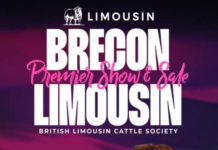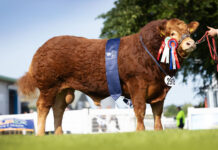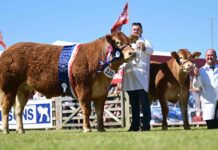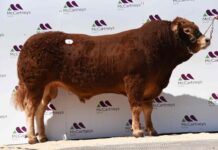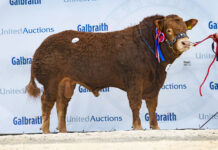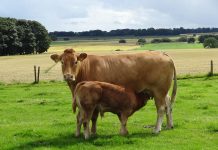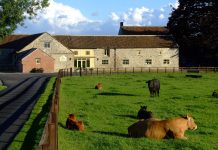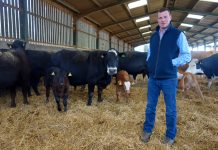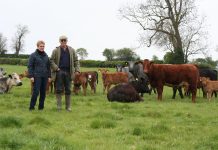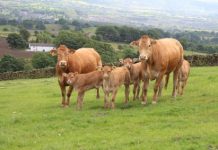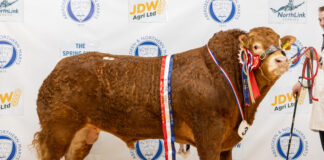Feature on the Reed family of West Biggins Farm, Frosterley, County Durham
The Reed family’s 12-14 month store cattle regularly top the auction sales at their local markets and they believe that the Limousin plays a key role in helping them to achieve this result.
West Biggins Farm is a true family hill farm, headed by William Reed, who at age 86 is still an active member of the workforce. He is assisted by his two sons, Michael and John, as well as John’s two sons, Stephen and Andrew, with the family celebrating their centenary of farm ownership last year.
The holding, which is a mixture of owned and rented land, spans a total of 1,400 acres, as well as rights on the adjoining common. The 190 suckler cows at West Biggins graze on land that reaches 1,200 feet above sea-level and the herd is predominantly Limousin, with some British Blue breeding. The cattle are run alongside a flock of more than 2,500 ewes.
All of the cows go to the Limousin bull and the current team includes three Keskadale bulls, all of which were bought privately from KD Harryman’s herd based in Keswick, Cumbria. The eldest is the 2010 Keskadale Fudge, by Hudscales Vince and out of a cow with Snoopy bloodlines. He arrived on the farm as a yearling and has thrown some good calves.
The second Keskadale bull is James, born in August 2014 and sired by Haltcliffe Exocet, out of Keskadale Beth. Meanwhile, the youngest Keskadale bull is Jaffa, a Rhiwllech Carlsberg son whose dam is Keskadale Davina. Born in April 2014, Jaffa has been resident since last May and the family is eagerly awaiting the imminent arrival of his calves.
Another team member is Garyvaughan Hidget, bred by Colin and Elaine Lewis, who are based in Welshpool, Powys. The November 2012 bull is by Plumtree Deus and his dam is Garyvaughan Fidget, with the Reeds bidding to 11,000gns to secure Hidget at a British Limousin Society Sale at Borderway Mart, Carlisle in the spring of 2014.
Lastly, but equally importantly, comes Haltcliffe IQ, a three-year-old Elgin son out of the Ocean daughter, Haltcliffe Atlantic and produced by noted breeders, Messrs Ridley of Hesket Newmarket in Wigton, Cumbria. IQ went under the hammer for 4,000gns at a Borderway Mart sale in May of last year, initially selling to J Ions and Company from Morpeth, Northumberland. The Reeds bought him straight off the farm through a private arrangement.
The family’s maximum budget for a bull is in the region of 11,000-12,000gns.
“Our number one priority is ease of calving and this is the principle factor that we consider, when we are studying EBVs,” stresses Michael. “He must also have good conformation, without being too large or very heavy-boned.
“We do study pedigrees and we try to find animals that we know have performed well in other suckler herds. One of the reasons why we like Keskadale bloodlines is because they are renowned for giving excellent results when used on commercial herds. It’s also about finding an animal which catches our eye; luckily, we are normally in agreement, when it comes to buying in new cattle.
“We only have one pedigree cow, however; she came from Ian Nattress’ Greenwell herd at Lanchester in County Durham, which has now been dispersed. We have bred an odd bull and kept it for ourselves, but we feel there is always a temptation to keep a home-bred bull that we would not have otherwise considered, had it not come from our own herd.”
Male calves are castrated and a couple of dozen of the best heifers are retained for breeding each year.
“We like to keep heifers with some British Blue breeding, whose mothers have required minimal veterinary attention, produced plenty of milk and performed well as breeders,” comments Michael.
“Another priority is temperament and we will reject an animal which shows any sign of unreliability. All of our yearling heifers are tied up in a byre during their first winter. Some people think this practice is laborious, but it saves time in the long term, by making them much quieter and easier to handle throughout their lifetime.”
In some years, cow numbers are made up through the purchase of females either at Kirkby Stephen or Carlisle
“We try to keep enough heifers to supply replacements, but if we run short we will buy in Limousin cross British Blue heifers with calves at foot,” explains Michael.
“We much prefer to buy this class of stock, because you’re never sure what you’re going to get with an in-calf heifer. But it is getting more difficult to find the quality that we’re seeking. Our cows reach an average of about 10 years, although some will go on to produce a healthy calf each year for longer and if that is the case, then we will keep her.”
The Reeds take great pride in preparing their cattle for the store ring and all of the stock are washed, dried and have their bellies and heads trimmed, to ensure that they look their best. Their efforts obviously pay off, because their cattle are usually in the top 5% of prices for their age group; some of the most recent sale figures have exceeded £1,000 per head.
The majority of the cows calve in the autumn, so that their progeny is ready in time for the annual October show and sale of Limousin cross suckled calves at Hexham Auction Mart, which is the main outlet. Some four or five animals are generally selected for showing on the day and it is not uncommon for the family to take a red rosette or two home with them. In 2013, they had the overall champion single, repeating the same success the following year.
In addition, they took the prize for the best pen of four bullocks in 2014 and for the best pen of four heifers at Hexham in 2015. The 2015 special sale saw 90 head forward from the Reeds average £1,087, with a price of £950 achieved this time. Buyers travel to the sale from all over Scotland and north-east England and some are specifically looking for West Biggins cattle.
Another store sale which the family attends on a regular basis is also at Hexham and is known locally as ‘Tow Law Day,’ having been named after the venue where it was previously held, before the auction site’s closure. Cull cows also sell readily and the Reeds find that Darlington Mart offers the best opportunity to achieve favourable prices.
The smaller group of spring-born calves find a ready market with buyers at Middleton-in Teesdale Auction Mart, where many of the heifers presented go on to join breeding herds. Commercial store cattle showing enthusiasts are often present and some of the Reed’s entries subsequently win awards for their new owners.
Over the winter, the cows are housed on straw. This is an expensive option, but the family finds that they fare better on a bedded system and have never been tempted to install cubicles. Most are fed a simple diet of silage and minerals, with calves given a bought-in concentrate, although heifers suckling calves are given a small quantity of pellets, to help them to maintain their condition. While the herd is not enrolled in a formal health scheme, close attention is paid to their welfare and they are routinely vaccinated to protect them against BVD.
With the autumn calving period beginning at the end of August, most of the cows calve outside, with very few assisted calvings and even fewer caesareans performed. However, the spring calvers calve outside and the sale of their calves helps with cash flow, by providing a steady income from February until May. To keep costs down, these calves are not given access to creep feed until the August.
With a large number of livestock to look after in the winter, silage-making is a key task and some 300 acres is cut annually. The main crop is taken at the end of June, with a second, smaller cut designated as sheep feed. The entire crop is made into big bales for easier handling, because the buildings on the rented land are scattered across a wide area.
The first Limousin bull arrived at West Biggins twenty five years ago and it seems highly likely that the breed will continue to serve the cows and heifers for at least as long into the future.
“Many of the smaller suckler herds have vanished from this area,” observes Michael. “But there is still a ready market for decent cattle and that is why we strive to produce stores of a high standard.
“We like the Limousin because it is easy calving and the calves are sharp and get to their feet very quickly after being born. They are also good to sell and the buyers look out for them,” concludes Michael.


